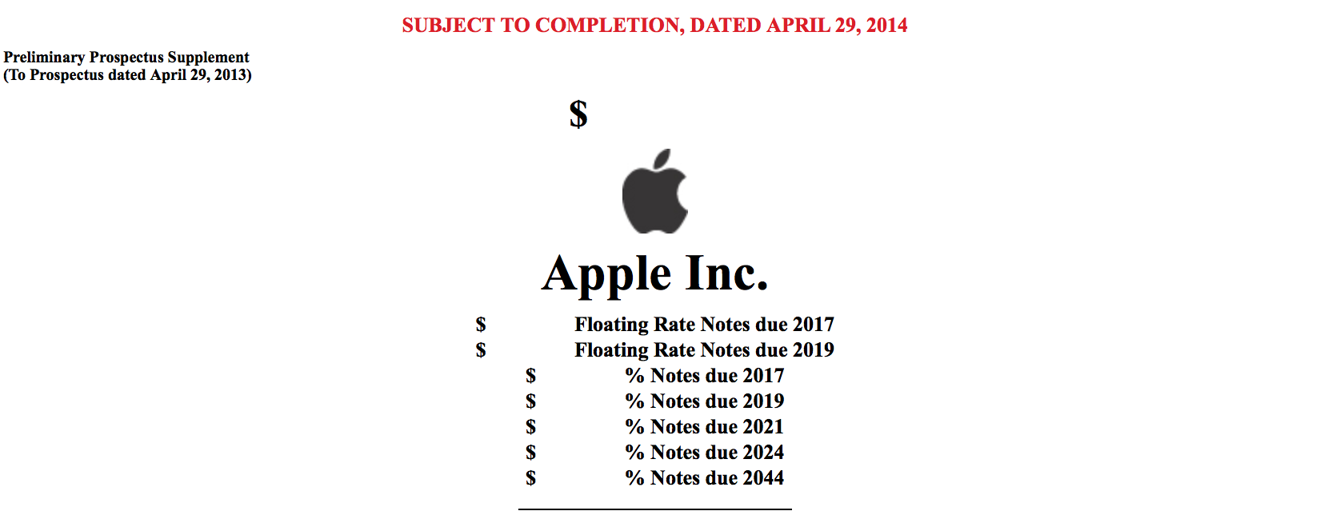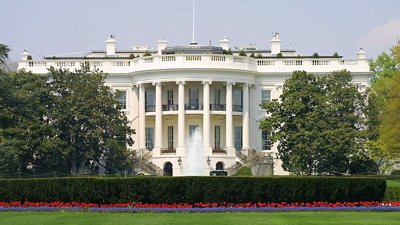Apple fueled excitement among investors on the U.S. bond market this week, when the company brought forward a highly sought after seven-part bond offering valued at $12 billion to help fund its share repurchase plans.
The bond sale issued on Tuesday was less than the $17 billion the company sold in a record setting offering a year ago. But investors believe that Apple isn't done yet, as the company signaled during its quarterly earnings conference call last week that it would likely raise "an amount of term debt financing similar to what we used in 2013," Corporate Comptroller Luca Maestri said.
The expectation is that in addition to Tuesday's $12 billion bond sale, the iPhone maker also plans to turn to foreign debt markets. This would allow the company to diversify its base, and to prevent saturation of the U.S. debt market with such a large sale.
With its U.S. sale completed, investors believe Apple may now turn to foreign markets for debt.
Investors believe Apple is waiting to come to market with potential issues in euros or sterling in the near future, according to Reuters. It is rumored that Apple will target the eurozone for low interest rates on an additional bond offering of around $7 billion.
For now, Apple's $17 billion sale from a year ago marks the second-highest bond offering in corporate history. At the time Apple held the record, but it was eclipsed by Verizon's sale of $49 billion in binds later in 2013.
Tuesday's sale generated excitement, generating more than $40 billion worth of orders in midday trading. Apple's bonds are double-A-plus, which is the second-highest possible rating.
The company sold fixed-rate bonds that mature in three, five, seven, 10 and 30 years, along with three-and five-year floaters.
Though Apple has some $150 billion in cash, almost all of that — $130 billion — is held overseas. Executives from the company have signaled numerous times, including last week, that they have no plans to repatriate the overseas cash, citing high tax rates for bringing the money to the U.S.
As a result, Apple has sought out more cash to increase its share buyback efforts, which are now totaled at $90 billion through the end of 2015. Apple initiated its massive capital reinvestment program to signal to investors that it is confident in the future of its business with continued strong iPhone sales and new products on the horizon.
 Neil Hughes
Neil Hughes







-m.jpg)






 William Gallagher
William Gallagher
 Amber Neely
Amber Neely
 Christine McKee
Christine McKee
 Malcolm Owen
Malcolm Owen






-m.jpg)



21 Comments
Apple sounds more and more like a well run and financially successful country!
Who knows, if the US increases their business-hostile tax policies, perhaps one day Apple will move their entire operation out of California...or out of the US.
A few of the shorter term issuances within this overall offering were at interest rates lower that Apple's dividend yield, which, assuming a $600 stock price is 2.2%. For at least those parts of the offering, or perhaps the entire offering when averaged together, it makes perfect sense to take on debt to remove shares from the market. I recall last year Apple borrowed below its stock's yield, saving itself more in dividend payments on the subsequently retired shares than the service on that debt. Through the lens of recent history, Apple's moves, both in the way it manages its finances and the way it manages its business, always look to be brilliant.
Students of business finance will find this fascinating. Borrowing money to buy back shares while you still have a ton of money in the bank. I'm sure this is getting covered in many business schools that have capitalization structure on the syllabus this semester.
[quote name="RadarTheKat" url="/t/178969/apple-sells-12-billion-in-us-bonds-to-fuel-capital-reinvestment#post_2524937"]A few of the shorter term issuances within this overall offering were at interest rates lower that Apple's dividend yield, which, assuming a $600 stock price is 2.2%. For at least those parts of the offering, or perhaps the entire offering when averaged together, it makes perfect sense to take on debt to remove shares from the market. I recall last year Apple borrowed below its stock's yield, saving itself more in dividend payments on the subsequently retired shares than the service on that debt. Through the lens of recent history, Apple's moves, both in the way it manages its finances and the way it manages its business, always look to be brilliant.[/quote] That's the 'Tim Effect'. :smokey: